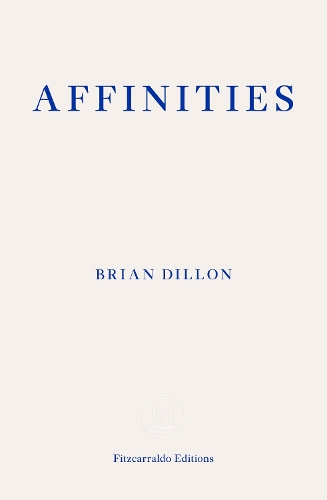
Affinities
(Paperback)
Publishing Details
Affinities
By (Author) Brian Dillon
Fitzcarraldo Editions
Fitzcarraldo Editions
16th May 2023
16th February 2023
United Kingdom
Classifications
General
Non Fiction
Literary theory
709
Physical Properties
Paperback
320
Width 127mm, Height 196mm
Description
In Affinities,Brian Dillon explores images and artists he is drawn to or loves, and tries to analyse the attraction.
What do we mean when we claim affinity with an object or picture, or say that affinities exist (not only formal) between such things What do feelings of affinity imply about individual or collective experience of art, and of the world The word ffinity'used to mean an attraction of opposites, between chemical elements. In his Effective Affinities, Goethe used the idea to think about the orbits and collisions of love. In the poetry and essays of Baudelaire, the writings of Walter Benjamin and Aby Warburg, the art of Tacita Dean and Moyra Davey, a partly buried history of affinity can be found.
Affinitiesis a critcal and personal study of a sensation that is not exactly taste, desire, or allyship, but has aspects of all. Approaching this subject via discrete examples, this book is first of all about images - mostly photographs - that have stayed with the author over many years, or grown in significance during months of pandemic isolation, when the visual field had shrunk.
Some of these are historical works by artists such as Julia Margaret Cameron, Dora Maar, Claude Cahun, Samuel Beckett and Andy Warhol. Others are more or less obscure scientific or vernacular images: sea creatures, migraine auras, astronomical illustrations derived from dreams. Also family photographs, film skills, records of atomic ruin. And contemporary art by Rink Kawauchi, Susan Hiller and John Stezaker.
Written as a series of linked essays, interwoven with a reflection on affinity itself, Affinitiescompletes a trilogy, with Essayismand Suppose a Sentence, about the intimate and abstract pleasures of reading and looking.
Reviews
'Dillon is a mournful, witty and original writer.' - Parul Sehgal, New York Times
'Dillon is a literary flaneur in the tradition of Baudelaire and Walter Benjamin.' - John Banville, Irish Times
Author Bio
Brian Dillon was born in Dublin in 1969. His books include Suppose a Sentence, Essayism, The Great Explosion(shortlisted for the Ondaatje Prize), Objects in This Mirror: Essays, I Am Sitting in a Room, Sanctuary, Tormented Hope: Nine Hypochondriac Lives (shortlisted for the Wellcome Book Prize) and In the Dark Room,which won the Irish Book Award for non-fiction. His writing has appeared in the New Yorker, Guardian, New York Times, London Review of Books, Times Literary Supplement, Bookforum, frieze, andArtforum. He is UK editor of Cabinetmagazine, and teaches Creative Writing at Queen Mary, University of London.
